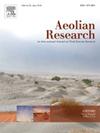Morphological dynamics of a trough-shaped blowout on a fixed dune in China
Abstract
The formation and development of blowouts is an important surface indication of sand drift activity in semiarid grassland areas; thus, an accurate understanding of their morphological evolution characteristics and dynamic processes is of significance for grassland desertification control. This study analyzed the long-term topographic change of a trough blowout developed on a fixed sand dune in the Otindag sandy land of China via ground measurements from 2011 to 2020 and examined the short-term airflow structure through field observations. The results indicated that the area of the deflation basin shows a state of continuous growth. The expansion of the deflation basin was most obvious on the western, southwestern and southern slopes, which is contrary to the regional prevailing wind direction. As airflow passes over the blowout, there is significant airflow steering with the change in topography, and the degrees of airflow steering and acceleration are determined by the direction of the approaching wind. Airflow expands and decelerates on the leeward side of the deflation basin, causing flow separation and producing a recirculation zone on the sheltered lee slopes. Based on a detailed analysis of the results, we suggest that the soil collapse and sand avalanches caused by vortices are the main reasons for the upwind expansion of the deflation basin. Collectively, these findings reveal a strong link between the blowout morphology and the airflow pattern.

 求助内容:
求助内容: 应助结果提醒方式:
应助结果提醒方式:


